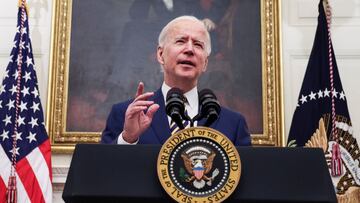What does the Biden coronavirus strategy include? Vaccines, masks, schools…
President Joe Biden begins his time in the White House by signing a raft of executive orders he hopes will help tackle the covid-19 pandemic in his first 100 days in office.


President Joe Biden has signed a number of key executive orders signalling the main priorities for the first stages of his time in office. As was the case throughout his run for the White House the coronavirus remained front and centre with pandemic response the main focus of the new administration.
The United States is currently experiencing the worst period of the pandemic to date and despite having now surpassed 400,000 covid-related deaths public health experts warn that the situation is likely to worsen. The executive orders signed on Thursday initiated the Biden administration’s new coronavirus strategy and encompassed a wide range of measures. Here’s some of the key takeaways as Biden sets his sights on pandemic response.
Nationwide push for greater mask-wearing
During the election campaign mask-wearing became a dangerously partisan issue, something that Biden has spoken about in recent days. Former President Donald Trump mocked Biden for wearing a face covering during televised debates and refused to impose a federal mask mandate.
Wearing masks isn't a partisan issue — it's a patriotic act that can save countless lives. That's why I signed an executive order today issuing a mask mandate on federal property. It's time to mask up, America.
— President Biden (@POTUS) January 21, 2021
Biden has taken the opposite approach and, acting on the advice of the Centers for Disease Control and Prevention, has made good on his pledge to mandate mask-wearing for both passengers and employees on public transport. This will form part of the ‘100 days to mask’ initiative that Biden spoke of during the election campaign, calling on Americans to 'mask up' for the first 100 days of his presidency to help get the national infection rate under control.
This focus on mask-wearing is borne out by the science and Leonard Marcus, director of the Aviation Public Health Initiative and advisor to Biden’s coronavirus response team, believes it can make a substantial difference.
He told NPR News: "Masks reduce the likelihood that someone will transmit the disease to someone else by anywhere from 40 to 60%. They reduce the likelihood that you will acquire the disease also by between 40 to 50%.”
Vaccine distribution to be overhauled
Trump had hailed the imminent arrival of an effective covid-19 vaccine as the antidote to the pandemic for months before leaving office, but the new administration is not impressed with the vaccine distribution network that they were handed. One source close to the Biden administration told CNN: "There is nothing for us to rework. We are going to have to build everything from scratch.”
President Biden has unveiled his national COVID-19 strategy, expanding the government’s response with emergency measures to produce more vaccine and speed up its rollout. @PeterAlexander reports. pic.twitter.com/WeK28TyoD8
— TODAY (@TODAYshow) January 22, 2021
As part of that effort Biden has directed the Federal Emergency Management Agency (FEMA) to set up 100 new national vaccination centres in the next month to ease the rollout. It is hoped that this will help the United States reach the target of 100 million shots administered in the first 100 days of Biden’s presidency, a pre-election pledge that he is sticking to.
White House Covid coordinator Jeff Zients has said that he is confident of hitting that target and promised that Biden was implementing a new and improved vaccine distribution system.
"For almost a year now, Americans could not look to the federal government for any strategy, let alone a comprehensive approach to respond to covid," said Zients. "And we've seen the tragic costs of that failure... that’ll change."
New push to reopen schools
While mask-wearing and vaccine distribution represent the two most effective ways to suppress the virus and turn the tide on the pandemic, the Biden administration is also planning further ahead with a roadmap for the return to normality.
Closing schools was one of the most controversial steps taken by governments around the world as they looked to control the coronavirus and Biden is eager to see them reopened as swiftly as safely possible. He is aiming to reopen the majority of K-12 schools within the first 100 days of his presidency with a renewed focus on masking, testing and cleaning.
Last fall we led 54 Democrats and republicans demanding trump require insurance companies to cover covid tests for workers and school children.
— Bill Pascrell, Jr. 🇺🇸🇺🇦 (@BillPascrell) January 22, 2021
Trump didn’t do squat, but today @POTUS Biden followed our calls and did just that. Outstanding. pic.twitter.com/HBeT0uI77A
Related stories
One of the executive orders signed on Thursday directs the Departments of Education and Health and Human Services to lay out a step-by-step guide to get children back into schools. There is also provision for additional PPE purchases using the FEMA disaster relief fund.
In reaction to the proposal the US Chamber of Commerce were optimistic, saying: “We support the new administration’s focus on removing roadblocks to vaccinations and reopening schools, both of which are important steps to accelerating a broad-based economic recovery for all Americans.”